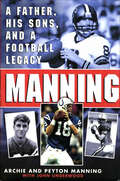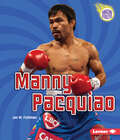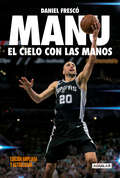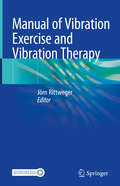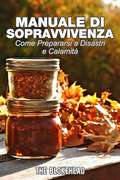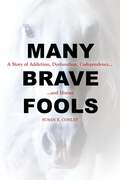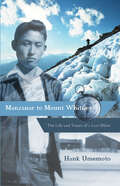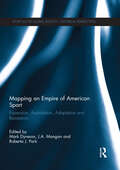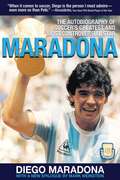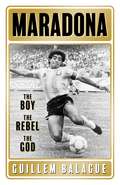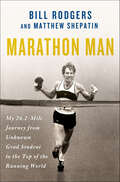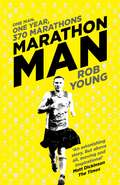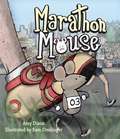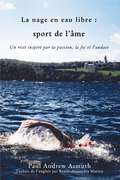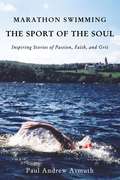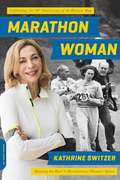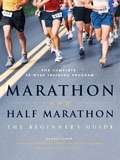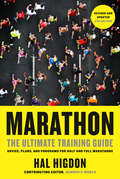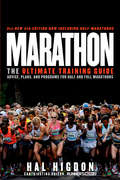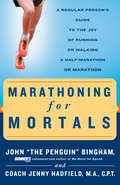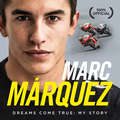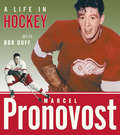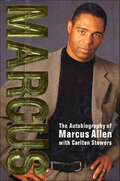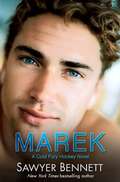- Table View
- List View
Manning: A Father, His Sons and a Football Legacy
by Peyton Manning Archie Manning John UnderwoodThe inspiring personal story of a family, an athletic tradition, and fifty years of a great all-American game.
Manny Pacquiao (Amazing Athletes Ser.)
by Jon M FishmanBoxer Manny Pacquiao has won multiple world championships and is the only fighter in the sport's history to win titles in eight different weight classes. When Manny fought Floyd Mayweather in 2015, many people called it the fight of the century. But Manny is much more than just a boxer. He is also a musician and an actor, and he has even played professional basketball. In 2010, Manny became a congressman in the Philippines. Learn more about the Filipino fighter who has taken the boxing world by storm.
Manu. El cielo con las manos: Edición ampliada y actualizada
by Daniel FrescóRelato apasionante y exhaustivo, pleno de anécdotas que revela aspectos desconocidos de Ginóbili: la vocación casi genética por el básquet, la obsesión por crecer y la audacia por alcanzar un destino para el que se sabía predestinado. La fuerza de voluntad, la decisión inconmovible de triunfar, el talento, la inteligencia y una rara habilidad para llegar al lugar indicado en el momento justo confluyeron para dar forma al destino singular de Emanuel Ginóbili, el más grande jugador de básquet de la Argentina de todos los tiempos y uno de los mejores del mundo. El escritor y periodista Daniel Frescó reconstruye esa vida única mediante una minuciosa investigación que incluye testimonios de familiares, amigos y compañeros, desde la llegada de su bisabuelo a Bahía Blanca, la integración y desarrollo de su familia en la ciudad, y su infancia hasta la consagración en el básquet mundial con la obtención de la medalla de oro en los Juegos Olímpicos de Grecia y cuatro anillos de la NBA. El resultado de esta investigación demuestra que la forja de una personalidad como la de Manu no es producto del azar o la buena fortuna sino de la tenacidad individual, de sus orígenes, de un entorno, de un momento y hasta de un país. Su ascenso es el paradigma del argentino que conquista el mundo pero detrás de la imagen pública se esconde una persona humilde, fiel a sus afectos y dispuesto a superar todos los contratiempos a fuerza de inteligencia y constancia. Este relato apasionante y exhaustivo, pleno de anécdotas, revela aspectos desconocidos de Ginóbili: la vocación casi genética por el básquet, la obsesión por crecer y la audacia para alcanzar un objetivo para el cual, de algún modo, se sabía predestinado. Manu. El cielo con las manos, el primer y más completo libro sobre Emanuel Ginóbili, entrega el retrato preciso de una vida y de una carrera cuyos éxitos trascienden los límites del deporte. A trece años de su publicación y cuando Manu transita el retiro de la actividad, se impone una edición definitiva no simplemente para explicar su trayectoria o sus triunfos sino para realizar una proyección de un legado, que ya es tan o más impactante que sus logros, e imaginar el devenir de su futuro. Grandes estrellas y leyendas de la NBA; entrenadores de altísimo nivel; compañeros y excompañeros de los Spurs y la Selección Argentina; los jóvenes basquetbolistas que toman su bandera; atletas que compartieron con él Juegos Olímpicos; referentes nacionales e internacionales de otros deportes y actividades terminan de redondear con valiosísimos conceptos la trascendencia de su figura. Todo ello para completar un libro que abarca generaciones, atraviesa los siglos XX y XXI, y muestra al Manu íntegro que delinea un inmenso legado que perdurará por siempre. «Es un campeón, un gran competidor y uno de los mejores Spurs. Fue muy divertido jugar contra él todos estos años.»LeBron James «Manu será recordado por siempre.»Lionel Messi «Conservó ese fuego interno y ese deseo interior de seguir ganando.»Roger Federer «Su carrera nos dice a todos que se puede.»Jorge Valdano «Es un campeón. Soy fan de Manu. Quisiera saber dónde está esa fuente de la juventud.»Stephen Curry
Manual of Vibration Exercise and Vibration Therapy
by Jörn RittwegerThis book addresses the practical aspects of vibration exercise and vibration therapy. In addition, it describes the technical and physiological background, providing applied scientists and doctors with a deeper understanding of the therapeutic potential that vibration exercise holds. Having first emerged two decades ago, vibration exercise has since established itself as a widespread form of physical exercise, used in all rehabilitation areas. The goal of this book is to close the gap between scientific knowledge and practice.Given that occupational exposure to vibration leads to well-known unfavorable effects, the book is also dedicated to potential risks, hazards and contra-indications and of course, the application of vibration therapy in a number of specific conditions is presented in a clinically usable fashion. Given its breadth of coverage, this book will be of interest to physiotherapists and exercise scientists, but also to a wider range of physicians working in the field of rehabilitation.
Manuale di sopravvivenza. Come prepararsi a disastri e calamità.
by The BlokeheadLe calamità colpiscono all’improvviso. Una banale tempesta può diventare devastante in poche ore. Un terremoto può verificarsi in qualsiasi momento e senza alcuna avvisaglia. Può accedere di tutto, senza che ci sia il tempo di prepararsi. Per questo è fondamentale essere sempre pronti, anche in assenza di minacce conclamate. Essere pronti è la chiave per la sopravvivenza. Questo libro vi aiuterà a prepararvi adeguatamente alle calamità. Perché tutto funzioni sono necessarie delle conoscenze, un’attenta pianificazione e una corretta esecuzione. Nessuno vuole ritrovarsi nel momento del bisogno e scoprire di aver sbagliato nel preparare le provviste o di non averne a sufficienza per superare il periodo critico. Tra le altre cose, questo libro vi mostrerà anche come prepararvi al meglio senza spendere una fortuna.
Many Brave Fools
by Susan E. ConleyCodependency, a compulsive behavior sometimes known as &“relationship addiction,&” is often characterized by a dysfunctional, one-sided relationship that is emotionally destructive–even abusive. For years Susan Conley found herself trapped, married to an addict whose health, welfare, and safety she valued far above her own. Over time she watched as she lost contact with her own needs, desires, and sense of self. But then at forty-two, after yet another crisis came to an anticlimactic resolution that left nothing healed and little to hope for, she decided, having never so much as touched a horse, to take up riding. Here, with humor and honesty, Conley chronicles her experiences, sharing how her pledge to rediscover herself following her divorce was aided, abetted, and challenged by the horses in her life. &“They were as large a part of my recovery as were any of the self-help books I read, personal development workshops I did, and 12-step meetings I attended,&” she writes. &“The struggle to heal the wounds of a dysfunctional marriage was actually made easier via the real wounds received from horseback riding.&”Many Brave Foolsexplores the ways in which horses enriched Conley's life, and how the process of making herself into a rider also helped her become the person she most wanted to be: not the &“ex-wife of an addict,&” but a responsive, confident, even courageous woman, entering the prime of her life.
Manzanar to Mount Whitney: The Life and Times of a Lost Hiker
by Hank UmemotoIn 1942, fourteen-year-old Hank Umemoto gazed out a barrack window at Manzanar Internment Camp, saw the silhouette of Mount Whitney against an indigo sky, and vowed that one day he would climb to the top. Fifty-seven years and a lifetime of stories later, at the age of seventy-one, he reached the summit. Part memoir and part hiker's diary, Manzanar to Mount Whitney gives an intimate, rollicking account of Japanese American life California before and after World War II. As he wanders through the mountains of California's Inland Empire, Umemoto recalls pieces of his childhood on a grape vineyard in the Sacramento Valley, his time at Manzanar, where beauty and hope were maintained despite the odds, and his later career as proprietor of a printing firm, all with grace, honesty, and unfailing humor. And all along, the peak of Mount Whitney casts its shadow, a symbol of freedom, beauty, and resilience.
Mapping an Empire of American Sport: Expansion, Assimilation, Adaptation and Resistance (Sport in the Global Society - Historical Perspectives)
by Mark Dyreson, J.A. Mangan and Roberta J. ParkSince the mid-nineteenth century, the United States has used sport as a vehicle for spreading its influence and extending its power, especially in the Western Hemisphere and around the Pacific Rim, but also in every corner of the rest of the world. Through modern sport in general, and through American pastimes such as baseball, basketball and the American variant of football in particular, the U.S. has sought to Americanize the globe’s masses in a long series of both domestic and foreign campaigns. Sport played roles in American programs of cultural, economic, and political expansion. Sport also contributed to American efforts to assimilate immigrant populations. Even in American games such as baseball and football, sport has also served as an agent of resistance to American imperial designs among the nations of the Western hemisphere and the Pacific Rim. As the twenty-first century begins, sport continues to shape American visions of a global empire as well as framing resistance to American imperial designs.Mapping an Empire of American Sport chronicles the dynamic tensions in the role of sport as an element in both the expansion of and the resistance to American power, and in sport’s dual role as an instrument for assimilation and adaptation.This book was published as a special issue of the International Journal of the History of Sport.
Maradona: The Autobiography of Soccer's Greatest and Most Controversial Star
by Diego Armando Maradona Mark Weinstein"Sometimes I think that my whole life is on film, that my whole life is in print. But it's not like that. There are things which are only in my heart-that no one knows. At last I have decided to tell everything."-Diego Maradona A poor boy from a Buenos Aires shanty town, Diego Maradona became a genius with the soccer ball, kicking his way to the heights of South American, European, and world soccer, yet his struggles with the pressures of life inside and outside the game repeatedly threatened to tear him and his legend down. Hero or villain, one thing about Maradona is certain: He was the greatest soccer player of his generation-and perhaps of all-time. Never before has the legendary Maradona given us his extraordinary story in his own words-until now. From his poverty-stricken origins to his greatest glories on the field, Maradona recounts, with astonishing frankness and brilliant insight, the pivotal moments of his life-the pressures of being a child prodigy, the infamous semi-final game against England in the 1986 World Cup, an incredible turn-around and the dream-turned-sour at Napoli, and the shame and disgrace of his positive drug test at USA 1994. In this amazingly honest autobiography, we see inside the mind of one of the most talented, controversial, and complex sportsmen of our times-a man torn between the demands of corporate club bosses, the fans, the media, and his own tempestuous personal life. With a new epilogue exclusive to this paperback edition that brings Maradona's remarkable story up-to-date and more than eighty wonderful photographs, Maradona is a confessional, a revelation, an apology, and a celebration.
Maradona: The Boy. The Rebel. The God.
by Guillem BalagueMARADONA is the definitive new biography of a true global icon, from world-renowned football writer and journalist Guillem Balagué. Diego Armando Maradona was widely acclaimed as a genius. One of the greatest footballers of all time, he was also one of the most controversial. In an international career with Argentina he earned 91 caps and scored 34 goals and played in four FIFA World Cups. With his unforgettable 'hand of God' goal and unsurpassed second one in the 1986 quarter-final against England, he captained his nation and led them to victory over West Germany in the final in Mexico. His vision, passing, ball control and dribbling skills, and his presence and leadership on the field, often electrified his own team's overall performance.Maradona's club career included dazzling spells in his own country at Argentinos Juniors, Boca Juniors and Newell's Old Boys, and in Europe with Barcelona, Napoli and Sevilla. Yet his life was one of relentless media attention, including tales of drug abuse and constant health issues.Based on in-depth interviews and first-hand stories, Guillem Balagué's masterly biography represents a psychological and sociological approach to the legend. This journey of exploration takes Guillem to Argentina, Spain, Italy and Dubai. Along the way, he asks what fosters such adulation, and how this adoration engendered a self-destructive personality. Even after his untimely death in 2020, Maradona continues to fascinate: his divine status seemingly preserved for ever.
Marathon Man: My 26.2-Mile Journey from Unknown Grad Student to the Top of the Running World
by Matthew Shepatin Bill RodgersThe legendary long-distance runner details his historic victory in the 1975 Boston Marathon that launched the modern running boomWithin a span of two hours and nine minutes, Bill Rodgers went from obscurity to legend, from Bill Rodgers to "Boston Billy." In doing so, he instantly became the people's champ and the poster boy for the soulful 1970s distance runner. Having won the Boston Marathon and New York Marathon four times each, he remains the only marathoner to have appeared on the cover of Sports Illustrated twice. Winning the Holy Grail of marathons in an unthinkable record time changed Bill's life forever.But his dramatic breakthrough in Boston also changed the lives of countless others, instilling in other American runners the belief that they could follow in his footsteps, and inspiring thousands of regular people to lace up their shoes and chase down their own dreams. In the year before Rodger's victory at the 1975 Boston Marathon, 20,000 people had completed a marathon in the United States. By 2009, participants reached nearly half a million.Thirty-seven years later Bill Rodgers still possesses the same warm, endearing, and whimsical spirit that turned him into one of America's most beloved athletes. In Marathon Man he details for the first time this historic race and the events that led him there.
Marathon Man: One Man, One Year, 370 Marathons
by Rob YoungMarathon Man is a truly remarkable book that will inspire all who read it to know that they can take on the biggest challenges in their lives and overcome them. It all began when Rob's fiancee, exasperated as he sat slumped in front of the television watching the London marathon, bet him 20p that he'd never complete even one such race. Watching the 40,000 competitors as they raised over £53 million for charity, Rob decided to take things a little bit further. Despite never having run a marathon before, he set out to achieve an astonishing new record: he would run more than 365 marathons in a year. So it was that Marathon Man UK was born. This book not only tells the incredible story of Young's quest, during which he broke numerous world records, but also provides vital lessons in how to motivate yourself to achieve your goals and essential tips (learned the very hard way) in how to run and keep on going. He takes the reader on a vivid journey through some of the most beautiful scenery, as they join him in some of the toughest marathons and ultra-marathons in the UK. After suffering horrendous abuse as a child, Young has developed a determination that few can match. It enabled him to complete 370 marathons in the year and to win the Race Across USA (competing with a group of elite marathon-runners) by 30 hours. As Paula Radcliffe commented: 'This is amazing!' Marathon Man shows exactly why and how he achieved it.
Marathon Mouse
by Amy Dixon Sam DenlingerThe mice of New York City dread the day of the New York City Marathon more than any other--the crowds, the large shoes, the noise. All of them, that is, except for Preston. He and his family live underneath the starting line on the Verrazano Bridge and every year Preston has dreamed of joining all the other runners in the marathon. This year, Preston is determined to make his dream come true, even though his family tells him that mice are not fit to run marathons. He trains hard leading up to the big day and when the race starts, he successfully dodges sneakers and crosses the finish line, showing his family that mice can do much more than just scurry.In the past few years, there has been a surge in marathon and half-marathon participation in the United States, and just last year, the New York City Marathon had over 45,000 finishers. Marathon Mouse is sure to be a welcome addition in a market that lacks picture books about running. There is a unique culture in the racing world that both parents who participate and kids who cheer on the sidelines know and love. And the story of Preston, who sets a goal and then follows through to achieve it, is a wonderful teaching tool for children, whether or not they are interested in running races.
Marathon Running: Physiology, Psychology, Nutrition and Training Aspects
by Billy Sperlich Christoph ZinnerThe book contains recent research about physiology,psychology, nutrition and training aspects of Marathon Running of differentage, gender and performance level. The basic knowledge of marathon running withexplanations of the physiological and psychological mechanisms induced bymarathon training with the associated adaptations and subsequent improvedphysiological capacities are presented in a reader friendly format forresearchers and practitioners. The book includes a full range of usefulpractical knowledge, as well as trainings principles to guide the reader to runmarathon faster. After reading the book the reader is able to develop trainingplans and owns the knowledge about up-to-date scientific results in the fieldsof physiology, psychology, nutrition in marathon running.
Marathon Swimming The Sport of the Soul/La nage en eau libre (French Language Edition): Inspiring Stories of Passion, Faith, and Grit
by Paul Andrew AsmuthFRENCH EDITION.
Marathon Swimming The Sport of the Soul: Inspiring Stories of Passion, Faith, and Grit
by Paul Andrew AsmuthWhen the plans and dreams of a young swimmer are shattered by the United States’ boycott of the 1980 Olympic Games in Moscow, God opens the door of new opportunities. For Paul Asmuth, then 22, it is the end of an unfulfilled dream, and the beginning of another journey, this one remarkable and life-changing. Plunging into the astounding, grueling, hypnotic, and often oddly beautiful world of international marathon swimming competitions, Asmuth experiences both triumph and tragedy, and, in a process as long and punishing as the marathon swims themselves, slowly discovers the best of himself. If you care for resumes, Asmuth is one of the most successful marathon swimmers in history. In the sapphire seas off Italy, in the frigid lakes of Quebec, Canada, in the marshy back bays of New Jersey, in the questionable waters ringing Manhattan, swimming distances from twenty to forty miles, Asmuth emerged victorious, often to thunderous acclaim. After multiple victories at the twenty-six-mile swim across Quebec’s Lac Memphremagog, up to 20,000 spectators would cheer and call him “le roi” (the king) of their lake. But true victory is not a matter of accolades or medals, and the stories that make a real difference unfold behind the headlines. Overcoming self-doubt, nausea, hypothermia, cruel tides and dark, watery shadows both real and imagined, Asmuth calls upon passion, iron-clad resolve, and steadfast faith to emerge a changed man, attaining success in its truest and most honest form. This success does not end when Asmuth retires from competing. Coming full circle, when he hangs up his swim suit, Paul takes the knowledge, lessons and examples he learned from his own experiences and some of the world’s greatest coaches, and turns to helping others with their swimming dreams. His prayers to give back are answered by coaching opportunities at multiple World Championships and two Olympic Games, where marathon swimming is now a contested event. But this is not just the tale of a swimmer. Like any great story, Paul’s transcends sport. By listening to the voice of faith and not of fear, new dreams are born, and God’s plans are revealed.
Marathon Woman: Running the Race to Revolutionize Women's Sports
by Kathrine SwitzerIn 1967, Kathrine Switzer was the first woman to officially run what was then the all male Boston Marathon, infuriating one of the event's directors who attempted to violently eject her. In what would become an iconic sports image, Switzer escaped and finished the race. This was a watershed moment for the sport, as well as a significant event in women's history.Including updates from the 2008 Summer Olympics, the paperback edition of Marathon Woman details the life of an incredible, pioneering athlete, and the lasting effect she's had on women's sports. Switzer's energy and drive permeate the pages of this warm, witty memoir as she describes everything from the childhood events that inspired her to succeed to her big win in the 1974 New York City Marathon, and beyond.
Marathon and Half-Marathon: The Beginner's Guide
by Sportmedbc Marnie Caron Jack TauntonOver 20 million Americans run recreationally, but doing it right is more than a matter of buying an expensive pair of shoes and heading for the track.<P><P> Building on the popularity of The Beginning Runner's Handbook, this practical, easy-to-use guide provides a step-by-step program for running a half or full marathon for the first time. It shows readers how to get motivated and set realistic goals, choose the proper shoes, eat right, build strength and endurance, and avoid sore muscles and injury. The book includes tips from elite runners on such subjects as staying motivated when the weather is extreme, running technique, running with a dog, and running partners. Finally, the book describes strategies for the race, what to expect on race day, and the psychological effects of finishing a half or full marathon. Most importantly, it includes a full training program designed to ensure that that crucial first race is a winner.
Marathon, Revised and Updated 5th Edition: The Ultimate Training Guide: Advice, Plans, and Programs for Half and Full Marathons
by Hal HigdonNow completely updated and revised--a new edition of the long-running marathon training guide that has helped more than half a million people reach their goals.Marathon: The Ultimate Training Guide is among the bestselling running books of all time for many reasons, but above all others is this one: It works. Marathon running has changed in the seven years since the fourth edition--there are more runners than ever before, the popularity of half-marathons has grown immensely, and guidelines for best recovery and diet practices have changed. This revised fifth edition includes a new chapter on ultramarathons, along with material on recovery techniques, several new training programs, and advice on how to win a Boston qualifying race and improve your personal record. At its core remains Hal Higdon's clear and essential information on injury prevention, training, and nutrition. Marathon demystifies the marathon experience and allows each runner to achieve peak performance without anguish or pain, taking the guesswork out of marathon training, whether it's for your first or fiftieth. With Higdon's comprehensive approach and tried-and-tested methods, any runner will learn how to optimize their training and achieve their marathon goals.
Marathon: The Ultimate Training Guide: Advice, Plans, and Programs for Half and Full Marat hons
by Hal Higdon<p>Especially in tough economic times, running offers an affordable and positive way to relieve stress and gain a sense of accomplishment. <p>Marathons and—more than ever—half-marathons are the ultimate achievement for runners and have experienced an unprecedented boom in the last several years. <p>New hunger for reliable information on marathon and half-marathon training, as well as new technologies that have revolutionized ordinary people's ability to train intelligently, means the time is right for a new edition of longtime Runner's World contributor Hal Higdon's classic guide to taking the guesswork out of preparing for a marathon, whether it's a reader's first or fiftieth. <p>At the core of the book is Higdon's clear and essential information on training, injury prevention, and nutrition. <p>With more than 25 percent new material, this fourth edition of a running classic is a must-own for both longtime runners and those new to the sport.
Marathoning for Mortals: A Regular Person's Guide to the Joy of Running or Walking a Half-Marathon or Mar athon
by John Bingham Jenny HadfieldOnce considered a feat for superhuman athletes, the marathon is now within every mortal's grasp. Former couch potato John Bingham has joined forces with coach Jenny Hadfield to create a winning plan that works for every mortal--even you.In Marathoning for Mortals, you'll find the courage to train, the willpower to persevere, and the tenacity to finish one mile after another. John and Jenny stick with you every step of the way, from your first insecure thoughts to your last-minute jitters to your supreme joy at the finish line. In Marathoning for Mortals, you'll find: • 8 training programs to run, run-walk, walk-run, or walk the half-marathon and marathon • The advice you need to physically, mentally, and spiritually reach your dreams • Tips to help you customize your training, buy the right shoes and apparel, and eat the best foods • Guidance for common motivational, physical, and emotional roadblocks Join John and Jenny on an amazing transformative journey where the finish line is just the beginning.
Marc Marquez: Dreams Come True: My Story
by Freddie Spencer‘He has all the potential to become the greatest of all time’ Valentino Rossi, nine-time world championMarc Márquez is a phenomenon in the world of motorsports. In his first season in MotoGP, at the tender age of 20, he achieved the extraordinary by becoming the youngest world champion ever. He’s currently dominating in his second season, and is set to become the greatest the sport has ever seen. In his first official biography - fully-illustrated with many unseen photographs - Marc offers an exclusive insight into his first year racing in the premier class and his historic championship win. Through the words of his team, his family and his rivals for the title, we begin to understand the answer to his remarkable success. It’s the story of Marc’s greatest risks and challenges, from vision problems that put a halt on his career to the huge crash in May that saw him flying off his bike at a staggering speed of 175 mph. But Marc continues to rewrite history, earning titles with his fearless racing and winning fans with his boyish charm and famous smile – and smashing every record along the way.
Marcel Pronovost
by Marcel Pronovost Bob Duff"Marcel was the most underrated defenceman ever to play in the league. When he hit you, you were hit. He was a tremendous skater and defensively, he was as good as anyone. He might have been overlooked by the press, but he was never overlooked by his teammates. Years later, I brought him back to Detroit as a coach. He is very knowledgeable and a very astute observer of the game."-Hall of Fame left-winger Ted Lindsay (Pronovost's teammate from 1949-57 and 1964-65)In the spring of 1950, Marcel Pronovost was called up from the minor leagues to play for the Detroit Red Wings during the Stanley Cup playoffs. The 18-year-old defenceman had never seen NHL ice time before, but his performance in the playoffs was so impressive that he took regular turns in the final series against the New York Rangers. That year, Marcel Provonost became the ninth player in history to win a Stanley Cup before playing a single regular-season NHL game.So began Pronovost's 65-year career in pro hockey. As a Red Wing he became a star defenceman in Detroit's golden age, winning three more Stanley Cups between 1952 and 1955, and skating side-by-side with Gordie Howe, Ted Lindsay, and Terry Sawchuk (who became a lifelong friend). He played a pivotal role in the Toronto Maple Leafs' last Stanley Cup win in 1967. He earned recognition on the NHL's First and Second All-Star Teams. And he has continued to serve the game for decades, becoming one of the few NHLers to have success as a player, a coach, and as a scout.Now, with Marcel Pronovost: A Life in Hockey, this legendary defenceman and Hockey Hall of Famer tells these and other stories for the first time. With over 125 photos and with on-the-ice recollections from the most exciting Original Six Era games ever played, A Life in Hockey is a hard-hitting memoir, and an insider's take on playing, coaching, and scouting that spans seven decades, and surveys one of the longest hockey careers of all time. A must-have autobiography for Red Wings fans, Leafs fans, and hockey buffs everywhere.
Marcus: The Autobiography of Marcus Allen
by Carlton Stowers Marcus AllenIn his eloquent words, hear mega-football superstar Marcus Allen--Heisman trophy winner, Super Bowl MVP, and record-breaking running back--tell his inspiring and unforgettable story.In Marcus, learn about his triumphant rise to athletic stardom, to his rocky 11-year relationship with Los Angeles Raiders coach Al Davis, to his controversial friendship with O.J. Simpson, and all the high and low points in between.Marcus on Al Davis:"I could neither understand nor determine why Al Davis had declared war against me. But for all the motives suggested, none involved the possibility that the issue might be racial. Al Davis was many things that I didn't admire, but he was no bigot." Marcus on O.J. Simpson:"I am and forever will be forever be tortured by the loss of two people who were my friends; one murdered, one now forced to live a lifetime being blamed for tragedy." Marcus on Football"It teaches hard lessons about success and failure, joy and disappointment. And when played well, it has a poetry all its own."
Marek: A Cold Fury Hockey Novel (Carolina Cold Fury Hockey #11)
by Sawyer BennettWhen the Carolina Cold Fury’s hottest young star gets blindsided by an ex with a scandalous secret, it’s game on. “One of the best voices in contemporary romance.”—New York Times bestselling author Lauren Layne Marek Fabritis is used to delivering blows, not receiving them. But when he gets tipped off by an anonymous email about his ex-girlfriend, the news leaves him ice cold—and it’s not because Gracen Moore is getting married to a total jerk. It’s the fact that Marek has a three-year-old daughter he never knew about. Now he’s going back home, not to play knight in shining armor but to make damn sure that no man takes what’s his. For the first time, there might be something more important than hockey. Gracen Moore has always loved Marek. That’s why she let him go, so he could pursue a career in the NHL. And that’s why she never told him about Lilly. Only now does Gracen realize that she made an unforgivable mistake. But is that any reason for Marek to crash her wedding and make an epic scene? If the spark that still smolders between them is to be trusted, maybe. Still, Gracen’s not getting her hopes up. Because she knows better than anyone that appearances aren’t always what they seem. . . .Advance praise for Marek“Marek is a steamy, emotional, second-chance romance that had me rooting for both deeply scarred characters. Sawyer Bennet never disappoints.”—Gillian Archer, author of Rough Ride“Another five-star read from Sawyer Bennet! A second-chance roller coaster of emotions. I was cheering for Marek from page one. Loved it.”—USA Today bestselling author Sidney Halston“Marek and Gracen share a difficult past. I enjoyed every minute of their journey toward happily ever after. One of my favorites in the series.”—Wendy S. Marcus“Get ready. The puck isn’t the only thing that is going to drop”—PopSugar The Carolina Cold Fury series from New York Times bestselling author Sawyer Bennett can be read together or separately: ALEX GARRETT ZACK RYKER HAWKE MAX ROMAN LUCAS VAN REED MAREK The Love Hurts series features sexy standalone novels: SEX IN THE STICKS JILTED And the Sugar Bowl series is one treat you’ll want to read in order: SUGAR DADDY SUGAR RUSH SUGAR FREE Includes an excerpt from another Loveswept title.
